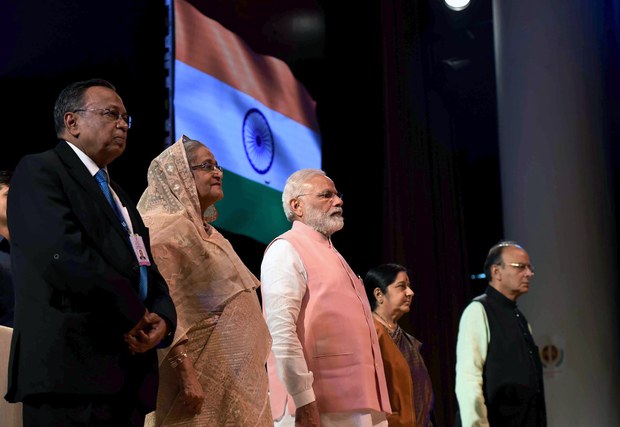Bangladesh, India Leaders Vow to Unblock Teesta Water-Sharing Deal
2017.04.10
New Delhi
 Bangladeshi Prime Minister Sheikh Hasina (second from left) and Indian Prime Minister Narendra Modi (center) attend a ceremony in New Delhi celebrating Indian soldiers who fought in the 1971 Bangladesh war of independence, April 8, 2017.
Bangladeshi Prime Minister Sheikh Hasina (second from left) and Indian Prime Minister Narendra Modi (center) attend a ceremony in New Delhi celebrating Indian soldiers who fought in the 1971 Bangladesh war of independence, April 8, 2017.
Bangladesh Prime Minister Sheikh Hasina on Monday returned home from India where she paved the way for negotiations on a crucial water-sharing pact that has been stuck in the pipeline since being drafted six years ago, according to analysts.
During her four-day trip – Hasina’s first visit to India under the leadership of Prime Minister Narendra Modi – the two countries also signed 22 agreements on defense, nuclear energy, information technology and cyber security issues, among measures seen as boosting bilateral ties. The Indian PM announced approximately $5 billion in loans to Bangladesh, including $500 million for defense procurement.
The unresolved issue of the Teesta River was high on the agenda. Although the neighboring countries have yet to reach a consensus on the long-pending matter of sharing water from the river, Hasina and Indian Prime Minister Narendra Modi vowed to come to an agreement soon.
Hasina said Modi once again “reiterated his government’s strong resolve to conclude the water-sharing treaty at the soonest. Once it happens, the face of Indo-Bangladesh relations would undergo another transformation.”
“We strongly believe our common water resources must act as a uniting force. A comprehensive basin-wide solution with in-built solution to water sharing of all common rivers holds the key to our common future,” Hasina said Monday as she wrapped up her Indian trip at an event hosted by New Delhi-based advocacy group India Foundation.
India and Bangladesh almost reached a break-through agreement in 2011 to share the Teesta River, which forms the border between the northeast Indian states of West Bengal and Sikkim. But that agreement was withdrawn at the last minute after West Bengal Chief Minister Mamata Banerjee protested, saying the treaty would render parts of her state dry.
The flood plains of the Teesta, which originates in Sikkim, span 2,750 square km (1,061 square miles) in Bangladesh and supports the livelihood of nearly 10 million people. Bangladesh officials are concerned that more than 100,000 hectares lies in waste because of excessive water usage by India.
“I assure you and the people of Bangladesh of our commitment and continuing efforts. I firmly believe that it is only my government and your government that can and will find an early solution to Teesta water sharing,” Modi told Hasina.
Hasina, Banerjee meet
During a rare meeting with Hasina on Saturday, Mamata Banerjee offered to share the water of Torsa River instead, saying her state would suffer if the Teesta River waters were divided.
“Over time, Mamata [Banerjee] has softened her position on the issue of sharing rivers. It’s a welcome move and is one of the big takeaways of Hasina’s visit,” Sanjoy Hazarika, an analyst of Northeast India affairs, told BenarNews.
Dhaka had already presented a proposal to jointly manage 54 rivers that flow through India and Bangladesh.
“It is not that Mamata Banerjee doesn’t want the Teesta agreement. She wants it but is only blocking it to maintain leverage over Modi, her political rival. It remains to be seen how Modi convinces her to get on board with the deal,” Bharat Karnad of the Center for Policy Research, a New Delhi-based think tank, told BenarNews.
Meanwhile, a Bangladeshi official slammed the West Bengal leader for obstructing the signing of the Teesta water-sharing agreement.
“The prime minister’s India visit has been successful. There is no doubt about it. But the game the West Bengal chief minister is playing with regard to the Teesta water sharing agreement is lamentable” Bangladesh’s Aviation and Tourism Minister, Rashed Khan Menon, told BenarNews.
But Tarek Shamsur Rahman, an international relations professor at Dhaka’s Jahangirnagar University, said the signed deals appear to have benefitted India the most.
“Comparatively we have not gotten what we had wanted. People are certain to be upset about this.
“We expected that steps would be taken to slash the trade deficit, but we have not seen any development to this end. Also, India has made no promise to lift the embargo on jute and jute products,” he said.
Akash Vashishtha in New Delhi, Jhumur Deb in Guwahati and Jesmin Papri in Dhaka contributed to this report.







